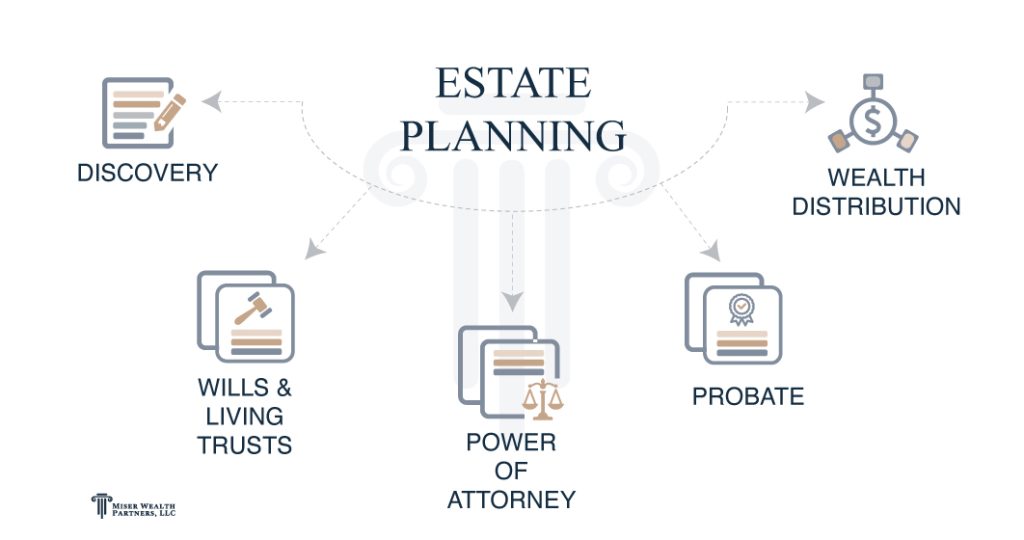Trust and estate administration can be quite complex and time sensitive, not to mention the processes differ from state to state. We’ve found that people often make various mistakes when managing their trust and estate administration on their own, which can result in significant consequences. At Miser Wealth Partners, we help our clients with every detail regarding their trust and estate administration to ensure everything is done correctly and there are no unwelcome surprises down the road.

What are some common mistakes made with trust and estate administration?
With so many complexities involved in trust and estate administration, it can be difficult to not overlook something. We’ve compiled the following list of common mistakes often experienced with these processes:
- Procrastination or delay: Failing to promptly initiate the trust and estate administration process can lead to complications. It’s essential to begin the administration process as soon as possible after the individual’s death to ensure timely distribution of assets and compliance with legal requirements.
- Lack of organization: Disorganization can make trust and estate administration even more challenging. Failing to keep proper records, including financial statements, account statements, and relevant documents, can result in confusion and delays.
- Failure to communicate: Communication is vital during the trust and estate administration process. Executors, trustees, beneficiaries, and other relevant parties should be kept informed about the progress, key decisions, and any potential issues that may arise. Failure to communicate can lead to misunderstandings, disputes, and mistrust.
- Improper asset valuation: Accurately valuing assets is crucial for various purposes, including tax reporting and distribution to beneficiaries. Failing to obtain proper appraisals or relying on outdated valuations can lead to incorrect asset distribution, tax underpayment or overpayment, and potential legal issues.
- Neglecting creditor claims: Executors and trustees have a responsibility to address valid creditor claims against the estate or trust. Failing to properly handle and address these claims can result in legal consequences, including personal liability for the executor or trustee.
- Mishandling beneficiary distributions: Trustees have a fiduciary duty to distribute assets to beneficiaries in accordance with the trust’s terms. Errors in determining the timing, amount, or method of distributions can lead to beneficiary disputes, lawsuits, or accusations of mismanagement.
- Tax compliance mistakes: Trust and estate administration involves various tax considerations, including income taxes, estate taxes, and inheritance taxes. Failing to properly handle tax obligations or overlooking tax planning opportunities can result in unnecessary tax burdens or penalties.
- Ignoring legal requirements: Each jurisdiction has specific legal requirements for trust and estate administration. Executors and trustees must adhere to these requirements, such as filing necessary documents with the court, providing required notices to beneficiaries, or obtaining court approvals when necessary.
- Emotional decision-making: Emotions can run high during trust and estate administration, particularly if conflicts or disagreements arise among beneficiaries. Making decisions based on personal emotions rather than considering the best interests of the estate or trust can lead to contentious situations and potential legal battles.
Why choose Miser Wealth Partners to manage my trust and estate administration?
Trust and estate administration involve many legal, financial, and tax considerations. Not seeking guidance from professionals can result in the mistakes listed above, missed opportunities, or non-compliance with laws and regulations. Miser Wealth Partners, LLC, specializes in trust and estate administration and helps to greatly minimize errors. Our team includes an experienced estate planning attorney along with a financial advisor and an IRS Enrolled Agent to provide guidance, ensure compliance with legal obligations, and help your family navigate the complexities of the process.
How can I get help with my trust and estate administration in East Tennessee?
You certainly don’t have to go it alone in your trust and estate administration. Call us at (865) 281-1616 or click here to schedule a time to meet with us. We’ll patiently guide you through the process from start to finish and shed light on any uncertainties so you can enjoy peace of mind.







